The Heroic Tale of Meir Feinstein and Moshe Barazani
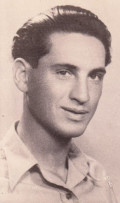 My uncle Meir Feinstein was born in the Old City of Jerusalem to
Eliezer Feinstein and his second wife, Bella,
in July 1929
(not on October 5, 1927, as indicated in many sources).
Eliezer came to
Eretz Israel in 1888 from
Brisk, which at that time, was a part of Poland. Bella arrived before the first World War from
Bialystock – now in Poland.
Eliezer was a prominent wine maker at his small winery on
HaGai street. The Feinstein winery provided the
large Jewish community in the Old City of Jerusalem with Kosher wine. He bought grapes from the Arabs in
Hebron and around Jerusalem.
After the
destructive Arab Riots in August 1929, Eliezer decided to cut his ties with his Arab suppliers, since some of them
participated in the killing of the Jews. He sold his winery and used the money to build several small houses on Zahav street in
"Kerem Avraham," one of the first neighborhoods of western Jerusalem.
He moved there with his wife and four children, and opened a small grocery store.
My father, Binyamin Feinstein, and his youngest brother, Meir, studied under the supervision of
Rabbi
Aryeh Levin at the
Talmud Torah (Yeshiva) "Etz Chayim".
My uncle Meir Feinstein was born in the Old City of Jerusalem to
Eliezer Feinstein and his second wife, Bella,
in July 1929
(not on October 5, 1927, as indicated in many sources).
Eliezer came to
Eretz Israel in 1888 from
Brisk, which at that time, was a part of Poland. Bella arrived before the first World War from
Bialystock – now in Poland.
Eliezer was a prominent wine maker at his small winery on
HaGai street. The Feinstein winery provided the
large Jewish community in the Old City of Jerusalem with Kosher wine. He bought grapes from the Arabs in
Hebron and around Jerusalem.
After the
destructive Arab Riots in August 1929, Eliezer decided to cut his ties with his Arab suppliers, since some of them
participated in the killing of the Jews. He sold his winery and used the money to build several small houses on Zahav street in
"Kerem Avraham," one of the first neighborhoods of western Jerusalem.
He moved there with his wife and four children, and opened a small grocery store.
My father, Binyamin Feinstein, and his youngest brother, Meir, studied under the supervision of
Rabbi
Aryeh Levin at the
Talmud Torah (Yeshiva) "Etz Chayim".
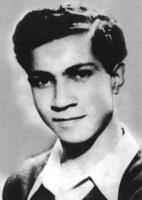 Moshe Barazani was born to Chacham (Sage) Avraham Barazani, and his wife, Lulu, on June 14, 1926 (ב' בתמוז תרפ"ו)
in Baghdad, Iraq. His father
came from a family of great Kabbalists from
Erbil in Kurdistan. His mother came from the family
of Rabbi Yehuda Fatiyah,
one of the primary Rabbis of Iraq and one of the leading
Kabbalists of the 20th century. (Moshe's last wish for his family was that they would read pages from Rabbi
Fatiyah's "Minchat Yehuda" for his memory.)
His father, Avraham, was an ardent believer that all Jews must live in Israel. Therefore, even though he was becoming
quite successful in Iraq, he decided to make Aliyah (immigrating from the diaspora to the Land of Israel). In 1934, the Barazani family,
complete with five children, arrived in Jerusalem. Life in Jerusalem was not easy at that time,
as vividly described in a recent testimony by Moshe's nephew,
Amnon Rotem. At a young age,
Moshe followed his brothers, and helped his family by working as a carpenter's apprentice, and as production worker
in a soda factory.
Moshe Barazani was born to Chacham (Sage) Avraham Barazani, and his wife, Lulu, on June 14, 1926 (ב' בתמוז תרפ"ו)
in Baghdad, Iraq. His father
came from a family of great Kabbalists from
Erbil in Kurdistan. His mother came from the family
of Rabbi Yehuda Fatiyah,
one of the primary Rabbis of Iraq and one of the leading
Kabbalists of the 20th century. (Moshe's last wish for his family was that they would read pages from Rabbi
Fatiyah's "Minchat Yehuda" for his memory.)
His father, Avraham, was an ardent believer that all Jews must live in Israel. Therefore, even though he was becoming
quite successful in Iraq, he decided to make Aliyah (immigrating from the diaspora to the Land of Israel). In 1934, the Barazani family,
complete with five children, arrived in Jerusalem. Life in Jerusalem was not easy at that time,
as vividly described in a recent testimony by Moshe's nephew,
Amnon Rotem. At a young age,
Moshe followed his brothers, and helped his family by working as a carpenter's apprentice, and as production worker
in a soda factory.
Joining the Underground Organizations
After Meir completed his Bar Mitzvah (at age 13), Eliezer Feinstein passed away due to a long illness. Eliezer gave unlimited credit to all his grocery customers, and after his death, many customers refuted their bills, causing the family to fall into hard financial times. Meir left school to help support the family, working in Jerusalem for a short period of time. He then left Jerusalem to work as a farmer in Givatayim, on Kibutz Negba, and on Kibutz Givat HaShlosha. In Givat HaShlosha, he joined the Haganah organization. My father said that even though Meir loved the hard agricultural work in the Kibutzim, his letters home indicated that he was not comfortable with the extreme communal life style that characterized these settlements. He was eager to do more.
In 1944, when he was just 15 years old, Meir learned of the terrible Holocaust in Europe, and decided to fight the Nazis by joining the British army. Of course, no army in the world would knowingly draft a fifteen-year-old child. This obstacle did not stop Meir. Taking advantage of his physical strength, and the fact that he looked much older than he reallt was, he convinced the Muchtar (Mayor) of Petach Tikva to issue him a certificate stating that he was 20 years old. This certificate opened the British army's door for Meir, but spelled his death several years later. The false certificate stood in the way of my father, Binyamin Feinstein, when he tried to convince the British court that Meir was under 18 years old, and thereby, could not be sentenced to death! Meir joined the British army and served more than two years in the Middle East Corps of Engineering. He served in Eretz Israel, in the Western Desert and Alexandria in Egypt, and in Beiruth, Lebanon. He was discharged from the British army in April 1946.
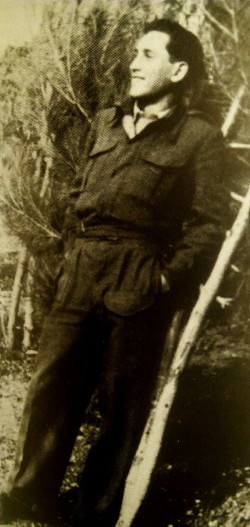
Meir served two and a half years in the British army
During his military service, he met fellow soldiers who were (secretly, of course) members of the Irgun Zvai Leumi (IZL, Etzel), and he helped them smuggle weapons and ammunition for the underground. Naturally, when Meir was discharged from the army in April 1946, he joined the Irgun. In view of Meir's extensive military training in the British army, he was assigned to the the Irgun combat force, called the HOK (ח"ק - חיל קרב). His first mission was a passive one, as a mere observer, during the attack on the King David Hotel on July 22, 1946. The Irgun planned to make Meir a commander, and while he was training in the Irgun course for HOK commanders, he was assigned (as a last minute replacement, according to my father) to the attack on the Jerusalem main train station. Meir was injured and captured in that fatal operation.
Moshe and all his brothers received a strong Zionist education from their parents from an early age. In their new home in Jerusalem, their parents taught them to love Eretz Israel and to protect the Jews. Therefore, it was not surprising that all the Barazani brothers joined the Lehi - Freedom Fighters for Israel. In fact, as you can see in the video of Moshe's nephew, Amnon Rotem, even Moshe's mother was helping the Lehi by cooking the glue that was used to hang the Lehi posters on the streets of Jerusalem. At first, Moshe joined the youth units of Lehi, and participated in the dangerous job of hanging the Lehi's posters. Sixteen-year-old Alexander Rubowitz, who performed the same job later in 1947, was captured, tortured, and killed by the British war hero Roy Farran in the notorious case that shocked England and Eretz Israel in 1947. After a year and half, Moshe wanted to do more. He helped in planting mines against the British forces. On October 22, 1946 he participated in the Lehi attack on the train station near the Arab village "Malcha" (now a prominent neighborhood of Jerusalem).
Meir's Attack on the Jerusalem Main Train Station
The Mission Objective
The Irgun's fight against the British rule was mainly restricted to major attacks on British infrastructure, as well as daring missions to free prisoners, or to "confiscate" British weapons for the use of the underground. The Irgun's operations were intended to convince the British military and the British public opinion that they should leave Eretz Israel. The goal was primarily to damage property, not to kill people, as Menachem Begin explained in his book - "The Revolt". Informed readers may stop me at this point, and ask about the attack on the King David Hotel where 91 people were killed. It is now an irrefutable fact that the Irgun sent warnings to several related parties, including one to the Hotel's switchboard, but the British authorities decided to ignore the warnings.
To achieve the goal of saving human life, the Irgun put their operations at great risk of failure by providing warnings, unlike today's terror organizations that blatantly attack civilians and have total disreagrd for the collateral damage. As we will see shortly, during this main train station attack, the fighters put out a warning sign that caught the attention of the police and forced the HOK attack unit to leave prematurely and in a hastened retreat.
This major operation was planned by Amichai Paglin ("Gidi"), the Irgun's famous chief of operations, and Itzchak Avinoam, the Irgun district commander of Jerusalem. The plan was to place three suitcases full of high explosives inside the station so that the destruction of the station would severely hurt the British military logistics. The explosive charges inside the suitcases had detonators with a thirty-minute delay mechanism, and the bombs were made tempered proof against disarming. Paglin and Avinoam selected Heinrich Reinhold ("Yanai"), a German born veteran Irgun commander, to command the operation and set the date to October 30, 1946. Reinhold was the deputy commander of the July 22, 1946 attack on the King David Hotel, and he was the explosive instructor in the HOK commanders course.
The Betrayal of Heinrich Reinhold
On October 29, 1946, Paglin and Avinoam came to meet Reinhold in his apartment in Rehavia, to have their final consultation before the attack. They were very surprised to find that Reinhold was missing and that his landlady did not know where he was. They were concerned that Reinhold was arrested by the British police or by the Haganah (during different periods, particularly the Saison, the organisation collaborated with the British against both the Irgun and the Lehi). Due to the current political constraints, they were reluctant to cancel or delay the attack which was planned for the next day. They assigned Eliyahu Levy ("Aviel"), another veteran Irgun commander who was involved in the planing, to head the operation. They decided to run several limited reconnaissance missions around the train station the next morning to see if the British were aware of the attack.
A short time after the Jerusalem train station attack, the Irgun realized that Reinhold was, in fact, an informer for the British CID (Criminal Investigations Department). He was recruited by the British sometime in 1946 and he told them everything he knew, including the plans for the Jerusalem train station attack. In exchange for his betrayal, the British immediately sent him to Belgium and helped him assume a new identity. This is the only case that an active HOK commander betrayed the organization, and it cost the life of my uncle. This sad story of a Jew betraying his brothers and sisters was very painful for the Jewish people fighting to restore their historical homeland. The Irgun tried to bring Reinhold to justice, but a kidnapping attempt in Belgium was thwarted by the local police. Later, the Irgun were unable to find him and his whereabouts are unknown to this day. More information about this traitor.
The Attack and the Capture of Meir and his Comrades
In the morning of October 30, 1946, the Irgun confiscated two taxi cars and convened the Irgun fighters to a safe house in the apartment of Menachem Madmoni, another Irgun fighter. Gidi and Avinoam briefed the fighters about the mission. Eight fighters were to participate in the attack. Including the newly assigned commander, the group consisted of Aviel, Meir, Sima Fleishhaker-Hoizman, Aryeh Epstein ("Eshel"), Daniel Azulai, Massud Biton, Yosef Levy ("Kushi"), and Moshe Horovitz. Aviel and Sima were disguised as a newlywed couple on their way to their honeymoon. Biton and Levy were disguised as Arab porters. Meir was the driver of one of the confiscated taxi cars that carried the "couple" and their suitcases.
In view of the concern about a possible mission compromise by Heinrich Reinhold, Avinoam sent a biker several times around the train station to verify that there was no special alert among the British forces. Unfortunately, the biker could not see that the British were preparing several ambushes for the attackers based on the betraying information given by Reinhold. The Irgun commanders approved the mission, and the two taxi cars carried out their instructions.
Biton and Levy, disguised as Arab porters, arrived first to the train station and stood with the other Arab porters in front of the train station. Eshel, Horovitz and Azulai, were placed inside the station as the cover-up unit. Meir arrived at the train station with Sima and Aviel, the "newlywed couple," and their three suitcases. The fighters activated the bombs in the car, a few minutes prior to their arrival at the train station, to reduce the 30-minute time delay of the bombs. Upon their arrival, Aviel approached the Arab porters at the entry of the station and selected Biton and Levy to assist him with the three suitcases. Aviel and Sima (wearing her red, elegant garment) followed the porters and went inside the station to buy their train tickets.
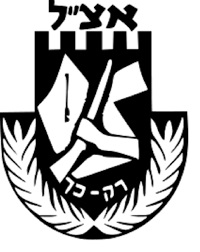 In accordance with the Irgun policy to minimize the collateral human damage,
Irgun fighters were expected to provide ample warning – a great risk to their
own lives, and to the success of their operation. Therefore, Sima placed a large
warning sign made from a white map on the suitcases. The sign said "caution - mines" in English, Hebrew and Arabic,
with the emblem of the Irgun. Unfortunately, an Arab policeman saw Sima placing the warning sign on the suitcases,
and he came and grabbed her. He also started to alert the people around them to the event.
Sima was able to hit the policeman and get loose, causing her red garment to be torn.
Aryeh Eshel, took out his gun and shot in the air.
In the ensuing commotion, all eight Irgun fighters ran back to one of the taxi cars,
and Meir started the car in a hasty retreat.
At that point, the British soldiers, who were waiting in their ambushes around the station due to Reinhold's treachery,
started to shoot on the departing car from every direction. A British armed carrier vehicle
chased the escaping car.
In accordance with the Irgun policy to minimize the collateral human damage,
Irgun fighters were expected to provide ample warning – a great risk to their
own lives, and to the success of their operation. Therefore, Sima placed a large
warning sign made from a white map on the suitcases. The sign said "caution - mines" in English, Hebrew and Arabic,
with the emblem of the Irgun. Unfortunately, an Arab policeman saw Sima placing the warning sign on the suitcases,
and he came and grabbed her. He also started to alert the people around them to the event.
Sima was able to hit the policeman and get loose, causing her red garment to be torn.
Aryeh Eshel, took out his gun and shot in the air.
In the ensuing commotion, all eight Irgun fighters ran back to one of the taxi cars,
and Meir started the car in a hasty retreat.
At that point, the British soldiers, who were waiting in their ambushes around the station due to Reinhold's treachery,
started to shoot on the departing car from every direction. A British armed carrier vehicle
chased the escaping car.
Meir's hand was severely hit by a clip of bullets, but he continue to drive the car. As he drove, he calmly told his friends that "he was driving with only one hand." At first his friends thought that he was just joking, but they soon realized that Meir's left hand was severely decimated by the bullets. Sima, who was a nurse and was sitting in the passenger seat near Meir, cut Meir's shirt and used it to cover the wounds. Aryeh Eshel later recalled that Meir's ability to drive the car with one hand during an armed chase saved the lives of the eight fighters. Meir was able to run away from the chasing vehicle, and got the car to the meeting point in the "Yemin Moshe" neighborhood, where Irgun girls were waiting to collect the weapons from the fighters. All the fighters (three of them injured) prepared to run away.
Daniel Azulai was severely injured by 11 bullets, and was unable to move. He yelled for help and Aryeh Eshel carried him on his back into an apartment in Yemin Moshe that belonged to a woman named Rachel. Sima cut the bed sheet into straps and used them to stop the bleeding in Azulai's right hand. According to Eshel's later testimony, this treatment saved Azulai's life. Eshel's clothes were stained with Azulai's blood, so he had to hide in another house in the neighborhood. He was later able to leave this house and safely return to his home. Aviel and Yosef Levy were able to run away to their safe house, away from the neighborhood. Horovitz, who was lightly injured, and Biton were able to run toward the Commercial Center near the Jaffa Gate, at the center of Jerusalem. However, they were both captured by Arab policemen for violation of the ensuing curfew.
Meir ran about a thousand feet and reached the house of the elderly Stein couple in Yemin Moshe. In accordance with some testimonies, Sima entered the Stein's house with Meir and placed Meir on the bed, continuing to nurse his wounds. A young boy from the neighborhood came rushing in and told Sima that the British policemen were following Meir's bloody traces and that they were approaching the house. Sima left and was able to get away from the British in the nick of time. The British policemen entered the Stein's house, and when they saw Meir, they tried to hit him. Meir told them (in his fluent English) "Stop! I am a prisoner of war."
The British announced a curfew in the Yemin Moshe neighborhood and asked all the men to come out. They soon caught the severely wounded Daniel Azulai. At 2 pm, a British officer in charge of the bomb squad tried to detonate the three suitcases that remained in the train station. Lifting the suitcases caused them to explode, killing the officer (and another soldier, in accordance with other sources). The explosion severely damaged the train station. It took the British more than a week to restore the train station for regular operation. This operation, as well as all the many other operations of the Irgun against the British, helped accelerate the eventual British withdrawal from Palestine.The British took Meir and Azulai to a military prison in the nearby German Colony neighborhood, denying them of the medical attention they desperately needed. After repeated protests by Meir, six armed policemen took them to a hospital. The doctor looked at Meir's injured hand and told Meir that the left hand must be amputated to avoid blood poisoning. Without any hesitation, Meir said "cut it."
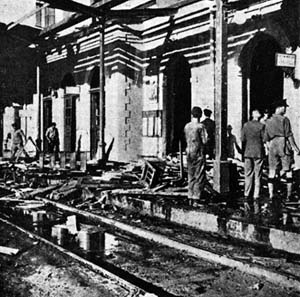
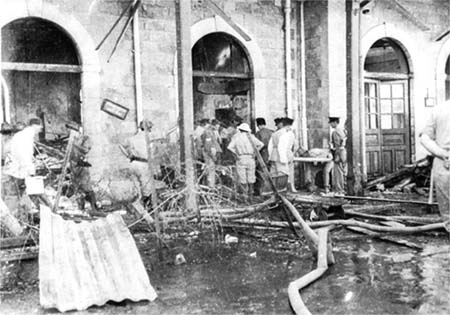
After the amputation of his left hand, Meir shared a hospital room with Dov Gruner, a remarkable Irgun hero who was executed in Acre a few days before the scheduled execution of Meir and Moshe. Gruner told other prisoners that he was very impressed with Meir's strong spirit, and the fact that even though Meir was recovering from a severe surgery himself, he was encouraging all the other injured fighters. My father, Binyamin Feinstein, detailed in his novel, Yedidya Hatalgi, how Meir was very inspired by the brave warrior Dov Gruner.
Moshe's Assassination Plan of Brigadier A.P. Davis
During a March 9, 1947 curfew in Jerusalem, Moshe was able to evade the British police and he reached his commander house, where he received his final mission. The mission was to assassinate Brigadier A.P. Davis, the commander of the Ninth Division, who was in charge of the military control of Jerusalem. It was quite an improvised mission, without much planning, and without any serious intelligence gathering. In Amnon Rotem's video presentation, he described the improvised nature of Moshe's mission as "a plan from today to today." Moshe received a Miles grenade, put it in his pocket and walked the Tachkemoni and Rashi streets in the Mekor Baruch neighborhood near the Schneller British base, waiting for the Brigadier's car. A British patrol surprised Moshe and caught him carrying the grenade in his pocket. At first, Moshe denied any connection to Lehi and claimed that he bought the grenade for 100 Mils, and that he could not reach his parents' home prior to the curfew. Later, he admitted to being a member of the Lehi, and demanded to be treated as a prisoner of war.
The Military Trials of Moshe and Meir
Moshe was tried on March 17, 1947, in a short trial that lasted only 90 minutes. Meir Feinstein, Daniel Azulai, Moshe Horovitz, and Massud Biton were the four participants of the Jerusalem train station attack, and the defendants in the second trial that started on March 26, and ended on April 3, 1947.
The British mood in Jerusalem was very sour that March. The Irgun carried out numerous attacks, including the successful attack on the Officers House in Beit Goldsmidt on the 1st of March. The brazen attack upon this major British target, which was situated well within the protected British military area of Jerusalem (nicknamed by the Jerusalemites as "Bevingrad"), resulted in 17 officers and soldiers dead (including several high ranking intelligence officers), and 27 injured. Britain's leading newspapers demanded their government to either control Eretz Israel or to leave the country right away. The British responded by enacting major curfews on Jerusalem and other cities for 16 days, but the underground continued with a burst of 68 attacks, including another brazen attack on March 13, 1947 on the heavily guarded "Schneller" military base in Jerusalem.
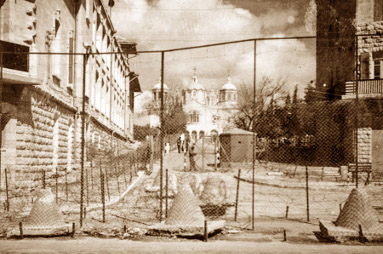
The Russian Compound inside "Bevingrad"
in central Jerusalem.
The Russian Orthodox Church appears in the middle.
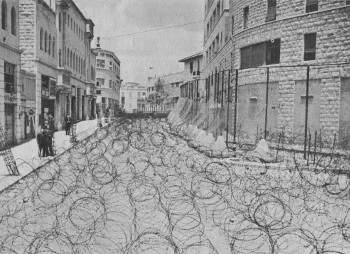
Saint Mary street (now "Shlomzion the Queen" street)
in central Jerusalem, bordering the "Bevingrad" military controlled area.
In a speech at the Parliament in London, Winston Churchil, the head of the opposition, demanded action from the government, stating that:
"A Hundred thousand British soldiers are held far away from their homes and are participating in a meaningless and hated war with the Jews - while we gain the hatred and derision of the world at the cost of £80,000,000."
In London, the Sunday Express ran a banner headline: "GOVERN OR GET OUT." The two trials were clearly a means for the British government in Palestine to demonstrate their harshness against the Lehi and the Irgun.
Moshe's Trial
Moshe's short trial before the British Military court was held on March 17, 1947. Moshe did not recognize the authority of the court to put him on trial. He refused to get an attorney appointed by the court, and he disregarded all the proceedings. He wore a black coat and khaki short pants. Covering his head with the traditional kippah, he spent most of the time reading his bible.
After the court read the charges against him, he was asked how he pleaded. He asked only to say few words, and without too much excitement, he declared:
"The Jewish people see you as an enemy and foreign occupier of its land. We, the members of Lehi - Freedom Fighters for Israel - are fighting you to liberate our country. In this war, I was captured by you and you have no right to put me on trial. You will not frighten us with the gallows, and you will never be able to destroy us. My people, like all the other people that are enslaved by you, will fight your Empire until it is destroyed."
The trial took only 90 minutes, and was over at 11:55. Moshe was sentenced to death by hanging. After announcing the sentence, the three judges, wearing the traditional red caps, left the court and Moshe shouted again: "You will not frighten us with the gallows." He started to sing the Hatikvah, but the policemen chained him and took him out of the court. His family arrived to the court at the minute the trial was over, as they were delayed by the curfew. Moshe called out to the Jewish press that covered the trial: "Tell the Yishuv to be strong and brave!"
Meir's Trial
Meir and Daniel Azulai were charged with two crimes - shooting with live ammunition within the train station; and the planting of the three bombs. Meir met his loved ones several times prior to the the trials. His loved ones included his fiancée, Rachel Kramer, his mother, Bella Feinstein, his brothers Binyamin and Zvi, and his sister, Aliza. All of them put tremendous pressure on him to defend himself in the trial and save himself from a likely execution. After all, he had the strongest argument that he was only 17 years old during the attack and hence he should not face execution! However, Meir rejected all the requests of his family and fiancée, and bluntly told them that he "will not humiliate himself in front of an occupying government" and that he will not ask for clemency.
Meir appeared in court without a lawyer. When the British officers read the charges and asked Meir how he would plead, Meir said: "I do not recognize the legality of this trial and I will not participate in the proceedings. I will answer the charges in a statement I will read later." He then sat and read a book by Zeev Jabotinsky (the spiritual leader of the Irgun) during the trial.
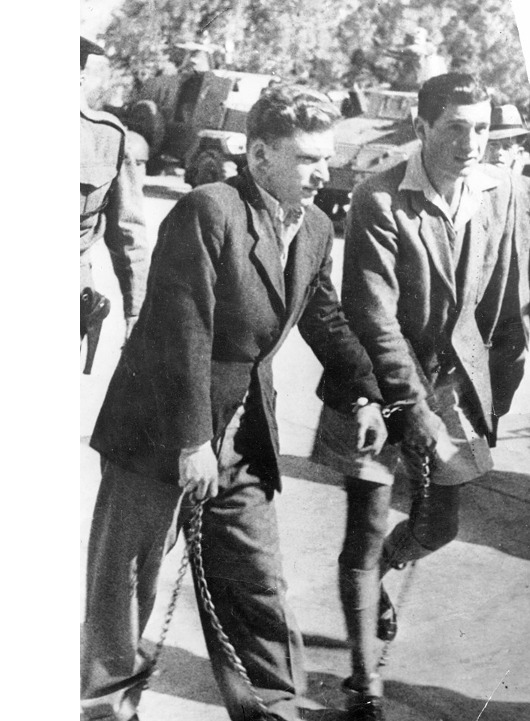
Meir Feinstein (right) and Moshe Horovitz brought to trial March 29, 1947.
Meir repeatedly said to his family and fiancée that "it is better to die with dignity than to live in humiliation." He did not participate in the trial at all, and merely read his books and the newspapers. He sent many smiles to his fiancée and family members who sat at the trial. The chairman of the court, Colonel Cooper, addressed Meir with various questions, and every time when he did not get an answer, he wrote in the protocol that "the defendant is very purposely keeping silent, showing a deep contempt of the court."
My father, Binyamin, who was 25.5 during the trial, was almost eight years older than Meir. He knew that Meir was only 17 years and eight months old, and therefore, establishing this fact would likely save Meir from capital punishment. Other under-aged Irgun and Lehi fighters that were put on trial for participating in different operations against the British, received life sentences in lieu of the death sentences. Many years earlier, during the Arab riots of 1938, the first of the Olei Hagardom, Shlomo Ben-Yosef, was captured by the British with Avraham Shein and Shalom Jurabin. The leaders of Beitar produced a certificate for Shein that he was under 18, causing his death sentence to be commuted to life in prison. In a later example, during the daring attack on the Acre Prison on May 4, 1947, five underground fighters were captured: Avshalom Haviv, Yaakov Weiss, Meir Nakar, Amnon Michaelov, and Nahman Zitterbaum. While Haviv, Nakar and Weiss were sentenced to death, Michaelov and Zitterbaum were sentenced to imprisonment "until the commissioner chooses to free them" due to their youth.
My father presented various certificates proving Meir's true age. However, the chairman of the court refused to believe that Meir was only 15 when he was drafted by the British army. "Do you say that his Majesty's Army recruited a 15-year-old child?" he asked. The court relied on the opinion by British doctors that Meir's X-ray images and other tests indicated that he was 23-25 years old. My father continued his efforts to convince the court that Meir was indeed underage, but then Meir told him "Binyamin, I ask you not to address these Nazi doctors."
On the sixth day of the trial, Meir suddenly asked to interrogate one of the witnesses – a British policeman. Meir exhibited his book, The Report of a Yeshiva Student by Aba Achimeir. On the first page, there was a large Swastika, drawn with a message, written in broken English, claiming: "No more debts." Meir asked the policeman: "I left this book in your car last Friday when you returned me to prison. I found this marking in the book. Do you know who wrote it?" Colonel Cooper asked to see the book and then he said: "It cannot be that an Englishman wrote this - there his a Swastika drawn here." Meir answered him: "Hitler is indeed dead, but his students and friends follow his teachings in earnest."
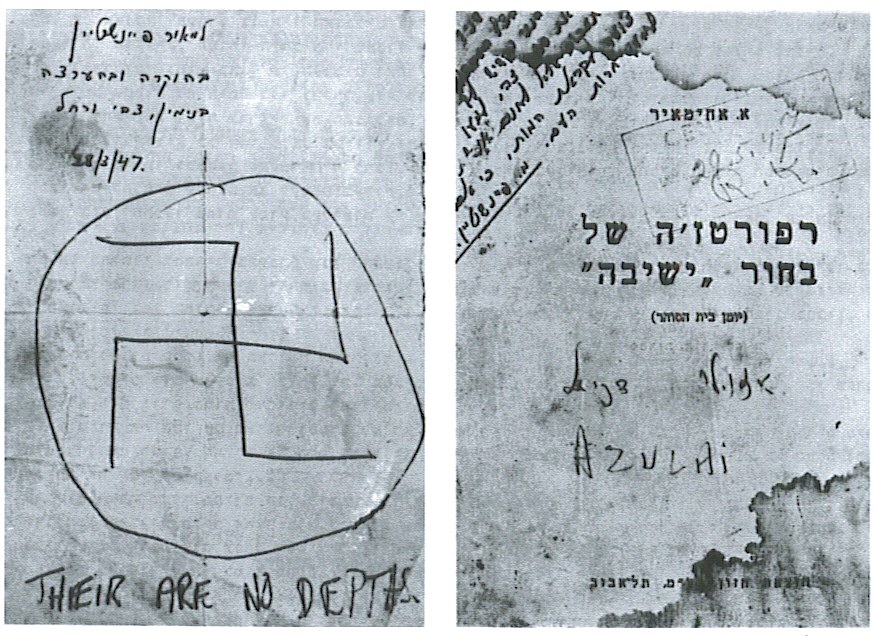
Left Image:The Nazi Swastika marking by a British Policeman on Meir's book. The book
was given to Meir a few days prior (March 28, 1947) by my father Binyamin,
their brother Zvi and by Meir's fiancée, Rachel Kramer.
Right Image: Later, Meir gave the book to his co-defendant, Daniel Azulai.
Azulai was also sentenced to death but his sentence was commuted to life
sentence, because, unknown to Meir, Azulai was an agent of the Haganah planted within
the Irgun! Meir's dedication of the book to Azulai said: "Dani! I dedicate this
book to you under the shadow of the gallows, so that you remember that I am not
walking to my death in vain, but for the liberty of our people."
After this exchange, Meir abruptly sat down and continued to be silent throughout the remainder of the proceedings. Before the reading of the verdict, Meir gave a defiant speech against the British rule, saying:
"Officers of the army of conquest! A regime of hanging trees is the regime you wish to impose on this land, which was destined to be a lighthouse for all of humanity, and in your foolish wickedness, you presumed that by this regime you will break our people's spirit, the people to whom this whole country had been a gallows. You were wrong. You will learn that you have encountered steel, steel forged in the fire of love and hatred - love for the homeland and freedom, hatred for enslavement and invaders. Burning steel it is. You will not break it. You will burn your hands."
"How great is your blindness, British tyrants? Did you not notice who stands against you in this campaign, unexampled in the history of mankind? Shall you scare us with death? We, who have listened for years to the rattling of the wheels of them Railroad cars, who led our brothers, our parents, the best of our nation - to slaughter, which too had no precedent in human history? We, who asked, and ask ourselves everyday: in what are we better than them? From the millions of our brothers? What have we won? For we could have been among them and with them in the days of fear and in the moments of dying."
"And to these recurring questions, there is in our conscience but one answer: we remained alive not to live and await in conditions of slavery and oppression, a new Treblinka. We remained alive, to ensure life, freedom and dignity for us, for our nation, for our children and their children for generations to come. We remained alive so that it wouldn't matter anymore that which happened there and might happen under your rule, the rule of treason, the rule of blood."
"Therefore we shall not be frightened, for we have learned and by countless of victims for nothing we have learned - that there is life worse than death, and there is death greater than life: and if you have not understand by now the specter of this Jewish nation, a nation that has nothing to lose except her bondage of slavery, except a perspective of a new Mejdanek, it is a sign, that you have been blinded so that you will be removed from the stage, the stage from which the divine supervision remove all those who stand up to the eternal people in order to destroy it. Assyria and Babylon, Ancient Greece and the Roman Empire, Spain and Germany preceded you. But you will follow their lead. It is the divine rule."
"This is what I wanted to tell you, British Officers, to you and your senders, and as to myself, I have nothing that I want to add on what my friends said. I am a captive, and I demand to be treated as a prisoner of war."
[Personal Note] The source from which I have taken the Hebrew text of this defiant speech has a note saying that "this speech was written in Meir's handwriting before it was read." This answered a question I had in mind from my youth, when my father told me about Meir's story - did Meir really write this speech himself at such a young age of seventeen and eight months? Apparently, the Irgun underground organization, with the great leadership of Menachem Begin, subjected all the young fighters to constant education. The Irgun newspaper "Herut" (Freedom), the underground radio station ("The Voice of Fighting Zion"), and the detailed propaganda posters, gave the young fighters tremendous knowledge about the goals of the fight, its justification, and the proper historical context. Meir, with his great thirst for knowledge, was clearly fluent with the state of the political affairs to be able write his own speech. My father also reported that when Meir left school at a young age in order to support the family, he was keen to expand his education and he even had aspirations to become an author later in life. My father and Zvi, Meir's other brother, sent him many books during his military service. It should also be emphasized that the Irgun gave total freedom of choice to their captured heroes to decide whether they wanted to mount a legal battle with a lawyer to save themselves, or to use the trial as an opportunity to make a politically defiant speech. Meir chose the latter option.On April 3, 1947, the military court announced the sentences of the four defendants. My father, Binyamin, tried again to convince the court that Meir was under age during the attack. However, the court refused to hear my father claims, because only the defendant, or an attorney representing the defendant, were allowed to plea in the case at that stage. This broke my father's heart because he knew that he was unable to save his younger brother.
After a 45-minute consultation, the judges returned with the traditional red caps that signaled the pending death sentences. Colonel Cooper deliver the verdicts. Horovitz and Biton were found not guilty and were set free, to the great happiness of their families. They were captured far away from Yemin Moshe, so the Irgun suggested that they will deny all accusations. A store keeper in the commercial center of Jerusalem testified that Horovitz was injured when he stepped outside his store when the curfew was declared.
Meir and Azulai were sentenced to death by hanging. When the sentence was read, they defiantly declared: "In blood and fire Judea fell, In blood and fire Judea will rise again." When the policemen chained Meir's remaining hand and his legs and dragged him out of the court hall, Meir sang the Hatikvah.
The Second Betrayal: Daniel Azulai was a Haganah Agent
On April 17, the supreme commander of the British army, General Barker, approved the death sentences of Meir and Moshe. To everyone's surprise, the death sentence of Daniel Azulai was commuted to a life sentence.
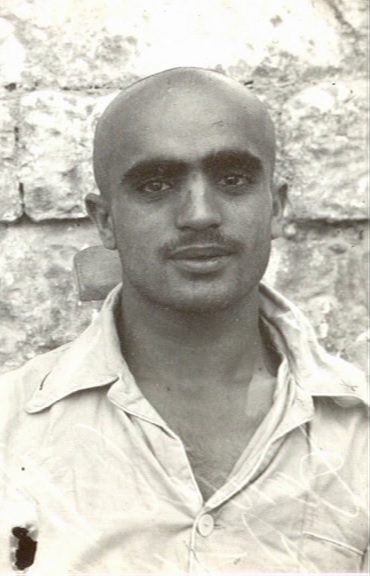
Daniel Azulai was an informer for the Haganah
Twenty years after these events, it was revealed that Daniel Azulai, the person that Meir thought was a close comrade and a partner to the Irgun's fight, was actually an agent of the Information Service of the Haganah who was planted inside the Irgun. The Haganah was intermittently collaborating with the British to stop the Irgun's operations, and to that end they planted agents (called "Hassid") inside the Irgun and the Lehi organizations.
This fact was revealed in the late 1960s, when two Mossad operatives were reminiscing on their past activities. One of them was a member of the Irgun and the other was a member of the Information Service of the Haganah. To the utmost surprise of the former Irgun member, the other operative revealed that they planted Azulai inside the Irgun to spy on their operations. He told him that when Azulai was injured, captured and tried, the head of the Haganah's Information Service went in sheer panic to Golda Meir, and she was able to persuade the British to save Azulai from death.
Meir did not know that the person to whom he gave his book was actually a spy. He could not have imagined during the time they shared the condemned cell in the Acre prison fortress, that it was only he who really faced the gallows. Azulai knew that his friends in the Jewish Agency would act to commute his sentence. The story was made public in 1980 by Aryeh Eshel, one of the Irgun fighters who participated in the Jerusalem train station attack. Eshel was researching materials about Meir's legacy. His exposé appeared in 1980 in the "Maariv" newspaper, and he sent some notes to my father about his findings. Azulai himself confirmed that he was a "Hassid" in front of several reliable witnesses. However, his page on the Hebrew Wikipedia has been deactivated, and I could not find more information on the remainder of his life.
In the Shadow of the Gallows
Moshe and Meir first met in the condemned cell in the Jerusalem Central Prison, where they immediately became close friends. They had very similar personalities, including self-reliance, maturity, immense love and dedication to the cause of liberating the Jewish people, and very friendly demeanors. When they were able to make contact with the other prisoners of the underground on their way to the showers, they always smiled and told them not to worry about them.
It was the British custom to lock each condemned man in a separate cell. There were two such cells near the gallows. However, the prison made an exception and locked both of them in the same cell since Meir lost his left hand and it was assumed that Moshe would assist him when needed. This arrangement turned out to be very useful during the brave final act of their young lives.
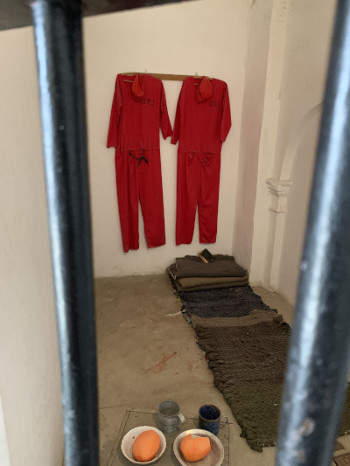
The condemned prisoners cell,
near the gallows, where Meir
and Moshe spent their last days.
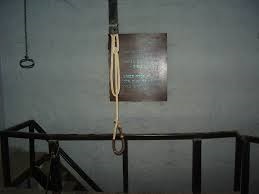
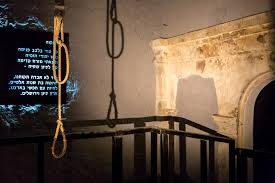
Living under the shadow of the gallows, in the next room.
Prior to their trials, Moshe had made arrangements with the other Lehi prisoners for the means of communication when he would be locked in the condemned prisoners cell, mostly under 24/7 isolation. The communication was sent via bananas. They were to cut narrow slits on the banana and insert tiny papers with coded messages written with small letters into the slits. The papers were covered by thin layers of gum to protect the messages from the humidity. The banana head was then closed to insure that even the most detailed inspections by the police would not discover the hidden messages.
Many pardon requests for Feinstein and Barazani were sent to the High Commissioner of Palestine, Lt. General Sir Alan Cunningham. The petitioners included David Ben-Gurion, the chairman of the Jewish Agency, Itzhak Ben-Zvi, in the name of the Jewish National Council, the two supreme Rabbis of Eretz Israel, Rabbi Uziel and Rabbi Herzog, the mayor of Tel-Aviv, Israel Rokach, and many others. The mayor of Tel-Aviv explicitly raised the under age issue of Meir. The families of Feinstein and Barazani also asked for pardon on their own behalf as families, but they were unable to convince the men who were actually condemned to ask directly for a pardon.
Binyamin and his mother, Bella Feinstein, begged Meir to request a pardon from the British. Meir's fiancée, Rachel Kramer with tears in her eyes, asked her lover to agree to sign a last minute pardon. At the very end, my father was confused to believe that he got permission from the Irgun commander, Menachem Begin, that Meir may sign a pardon request. Reluctantly, and after his mother threatened that she would kill herself if he did not sign, Meir added his signature to a last minute improvised request written by my father. But it was too late, as my father detailed in his book, Yedidya Hatalgi.
The British hinted several times to Moshe that if he asked for a pardon, he would be saved from hanging. But Moshe strongly rejected any possibility that he would ask for pardon, so as not to satisfy the British, and to demonstrate to them that the underground fighters were not afraid to die for their cause.
When Moshe met his father for the last Saturday before his death, his father tried to convince him to ask for a pardon. But Moshe told him: "... Father, you are a religious Jew who believes in the next world. So why are you so sorry for me? I am only one drop in the sea of six million brothers and sisters (who perished in the Holocaust) ...I am just a sacrifice for our people and our land. Our blood is not going to waste - from it the people of Israel will be resurrected."
Moshe remained in a good mood even under the shadow of the gallows. When he saw his fellow Lehi prisoners, he was all smiles, asking them to not worry for him. He asked them to send greetings to his brothers, who were also members of Lehi. He asked them to convey his warmest kisses to Geulah Cohen, the voice of the Lehi underground radio station, for her successful and dramatic escape from the prison's hospital.
Rabbi Aryeh Levin, the "father of the prisoners" was visiting Meir and Moshe and the other prisoners every Saturday, and encouraged their spirits. Meir and my father were his students at Talmud Torah "Etz-Chayim," and the rabbi admired the spirit and strength of his former student.
In the meantime, the British rejected all the pardons (except for Azulai, who was, as we have noted, a planted agent of the Haganah in the Irgun). Menachem Begin's policy was that if the British hang any of the Irgun men, the Irgun will hang British soldiers in retaliation. Earlier, during the pending execution of Dov Gruner, the Irgun captured three high ranking British officials and threatened to execute them. The Irgun released the British officials when it seemed that the British government decided to delay Gruner's execution indefinitely. (Later in July 1947, the Irgun actually hanged two British sergeants in retaliation of the hanging of the last three Olei Hagardom Avshalom Haviv, Yaakov Weiss, and Meir Nakar.)
In view of the retaliation threat, the British increased their readiness to avoid any kidnapping of their soldiers. They announced many more curfews, and they used announcements on the radio instead of using sirens. Many citizens were not aware that a curfew was in place because they did not listen to the radio. The result - the British shot dead Ovadia Misrachi, a father of ten, and another woman was seriously injured. Both were residents of Jerusalem, unaware that a curfew was in place.
Meir made a lot of efforts to leave his messages for future generations. He often wrote short messages with his signature on the pages of different books. In one instance, he wrote "It is better to die with weapons in hands than to live with raised hands." In another, he wrote "One who wants to live in honor must fight in order to live."
There was the harsh atmosphere of the looming of death at the Feinstein house on Zahav Street of Kerem Avraham. A journalist who came to interview the family talked to Meir's mother, Bella Feinstein. She bitterly complained about the trial. "I am the one who gave birth to Meir, and I know what is his true age. The British believe the doctors who said he is 23-25, but I know he is less than 18 years old. Meir has suffered enough when they denied him medical care, which cause him to lose his hand. This should have been punishment enough," my grandmother Bella said bitterly.
The "Operation Samson" Attack Plan
The Lehi were plotting for some time a Samson-like attack for their condemned men. The idea was formulated along the story of Samson, the last of the Biblical Judges of Israel. Samson’s death was his ultimate victory against the Philistines. After he gave up the secret of his supreme power to his mistress Delilah, the Philistines captured Samson, blinded him and bound him onto two pillars in their temple in Gaza for the amusement of the Philistine worshipers. Samson prayed to God, asking for his strength to return one more time (Judges 16:28). God responded, and Samson pushed against the pillars and brought the entire temple down, killing himself and all those in the temple with him. “So the dead which he slew at his death were more than they which he slew in his life...” (Judges 16:30). The attack plan was amply code-named "Operation Samson".
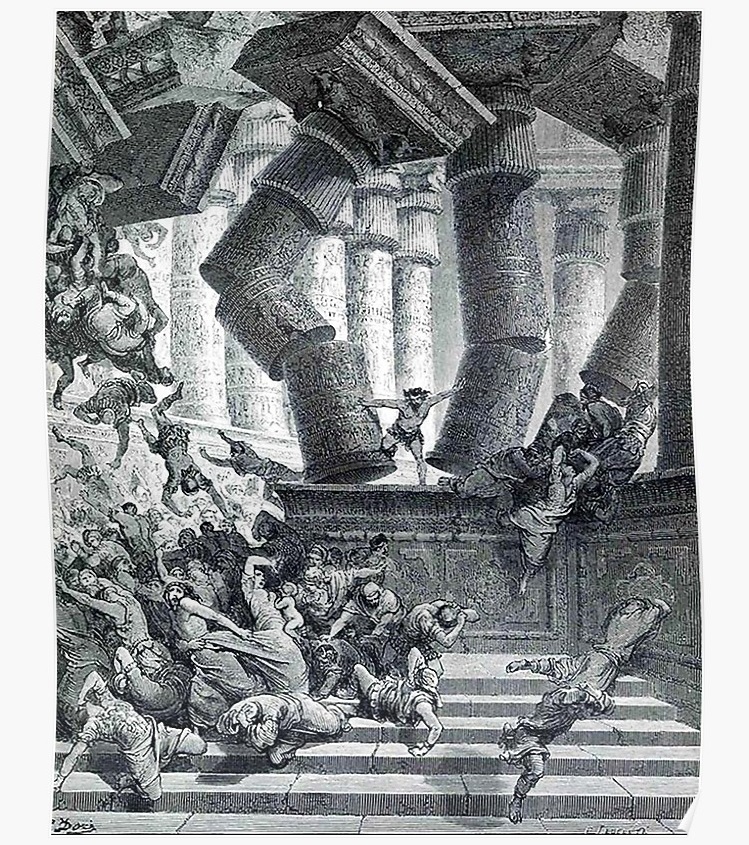
Gustave Doré's masterpiece: The Death of Samson. My brother, Eliezer, reported that when he received Meir's Gustave Doré's Illustrated Bible, this image was apparently viewed the most times by Meir and Moshe.
Meir and Moshe readily accepted the "Samson" plan after its details were smuggled to their cell via the messages hidden in their bananas. Since this was a plan designed by Lehi, Menachem Begin, the Irgun commander, had to personally approve Meir's participation. According to this plan, their fellow prisoners would smuggle them some explosives so they can kill themselves together with their British executioners in their final moment of life. The custom in all British executions in Palestine was that the commander of the prison and other high ranking officers attend the execution, thus providing prime targets for the plan. From their messages, it was clear that both Meir and Moshe were satisfied that they could use their death to inflict a spectacular upset on the enemy.
The problem was how to smuggle the explosives and how to make them explode with short notice. The designer of the explosives was Eliezer Ben-Ami, a Lehi prisoner at the Central Prison who had excellent technical skills and was working in the machine shops of the prison. Ben-Ami, who is still alive today, appeared in many interviews in which he told how he developed the grenades for this mission. All of these interviews were conducted in Hebrew, to the best of my research. He first thought to use the Tefilin as the container of the grenades, since the Tefillin, as a religious object, can easily be transferred to the condemned prisoners. However, when he got a sample Tefillin from Rabbi Levin (who was not aware of the Samson death plan, as he objected to any suicide plan), he soon realized that there was not enough room inside the Tefillin's small enclosure for meaningful explosive charges.
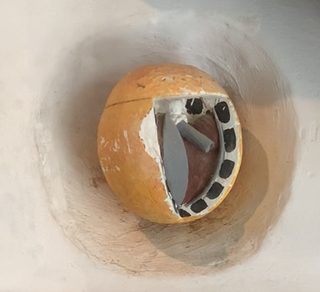 Ben-Ami recounted that one day he looked at several oranges, and he had a Eureka moment: he could
use oranges for the mission. He took three oranges, cut their top caps, removed their contents,
filled them with explosives,
and inserted small pieces of metal (which were carefully collected by another Lehi prisoner working on a drilling
machine) around their peel. He installed a one-second delay fuse that could be activated with
a cigarette. Ben-Ami said that this was the only instance where you could use a one-second delay detonator for a grenade, as
it was intended for a suicide mission. Most military grenades use a three-second delay.
After the construction, the top caps of the oranges were re-connected using small needles. He kept one orange in
his room and the other two were sent to the condemned mens' cell, along with other items of food.
Ben-Ami recounted that one day he looked at several oranges, and he had a Eureka moment: he could
use oranges for the mission. He took three oranges, cut their top caps, removed their contents,
filled them with explosives,
and inserted small pieces of metal (which were carefully collected by another Lehi prisoner working on a drilling
machine) around their peel. He installed a one-second delay fuse that could be activated with
a cigarette. Ben-Ami said that this was the only instance where you could use a one-second delay detonator for a grenade, as
it was intended for a suicide mission. Most military grenades use a three-second delay.
After the construction, the top caps of the oranges were re-connected using small needles. He kept one orange in
his room and the other two were sent to the condemned mens' cell, along with other items of food.
The two oranges made their way safely to the condemned mens' cell, much to the relief of Moshe and Meir, as they were very anxious that the British might hang them before they received the explosives. Ben-Ami kept the third grenade in his own prison cell so that he could monitor when the orange dries up and its peel starts to break apart, revealing the hidden metal pieces and the explosives. He knew that when his orange started to peel, they would need to somehow replace the other two grenades. He said in one of his interviews, that early on the day of execution, before he and the other prisoners knew about the pending execution, his orange started to deteriorate. He frantically began to think about how to replace the other two oranges. But then came the solemn news that the execution would take place that night.
The Final Sacrifice
It was on April 21, 1947, that rumors started to circulate across Jerusalem that Feinstein and Barazani were to be executed that night. A full curfew was declared throughout all the Jewish neighborhoods of Jerusalem. The condemned men were notified at 6 pm that they would be executed on the following morning at 4 am. The British authorities wanted to avoid the debacle of the previous execution that took place a week earlier in Acre. On April 16, the British hanged Dov Gruner, Yehiel Drezner, Eliezer Kashani, and Moredachai Alkahi without letting the condemned men see a Rabbi prior to their execution. This fiasco created a worldwide condemnation of the British government. This time, the British were determined to get a Rabbi to visit Meir and Moshe on the night of their execution.
Rabbi Aryeh Levin was called in the evening to join the condemned men and perform the Vidui (confession) prayer. The Rabbi refused to come because he was concerned that some disaster might happen. He was heartbroken for failing to save them. The Rabbi came from the great Yeshiva of Brisk, in the same town from which Meir's parents came to Jerusalem, and he knew Meir since he was his student from a very young age. The Rabbi mourned: "What is their sin? ... On what crime do they need to confess? There are no bigger saints from these two youngsters who are going to the gallows for Kiddush Hashem and for the sake of the people of Israel." This was the only time that the heartbroken Rabbi Levin, the "Father of the Prisoners," refused to come to the Central Prison of Jerusalem.
Rabbi Yaakov Goldman, the official Rabbi of the Jewish National council, agreed to come to them in the evening. The Rabbi was very impressed when he found the two condemned men in high spirits, just a few hours before their cruel death. I have created a detailed page about Rabbi Yaakov Goldman, which includes a recent video of his son, Tuvia Goldman, describing the testimony of the Rabbi from that fateful night.
The Rabbi met Meir and Moshe at 9:15 pm, and he stayed with them until about 11:00pm. They Sang "Adon Olam" and said the Vidui prayer with the Rabbi. They gave the Rabbi their remaining cigarettes and asked him to divide them among their fellow underground prisoners and the good British jailer, Thomas Henry Goodwin, who, they emphasized, treated them fairly.
And then came the terrible news for Moshe and Meir. The Rabbi announced that he would be present at the execution, because he wanted them to see the "face of a loving brother and not the face of an enemy" before they die. They immediately realized that his presence would eliminate their great Samson plan as they did not wish to harm the Rabbi who would be standing with the executioners! But of course, they could not reveal their final mission to the Rabbi. They did their best to convince the Rabbi to go back home, as the hour was already late. But it did not work. The Rabbi insisted. So they sang the "Hatikvah" and the Rabbi went to the Officer Room in the prison, expecting to return at 4 am for the execution. The Rabbi left them a few matches to enjoy their remaining cigarettes.
As the Rabbi left, they decided that they could not continue with the Samson plan. They wanted to spare the Rabbi. Their only potential "enemy" target was their "good jailer" Thomas Henry Goodwin, who treated them fairly. They decided to spare Goodwin's life too. At 11:40 pm they placed the two grenades between their hearts and lit the fuse with their last cigarettes. By killing themselves at their own hands it came to pass that during the entire Jewish revolt against the British to free Eretz Israel, not a single Jew was hanged in the gallows of the holy city of Jerusalem.
The heroic death of Meir and Moshe became the main headline the next day in most of the newspapers of the world. In Eretz Israel, every Jew mourned the loss of two of the best children of Israel. Even the Socialist poet Natan Alterman, who strongly opposed the Irgun and the Lehi, wrote a poem titled At the Night of Suicide, that praised the two heroes.
The Funeral
The chief Rabbi Herzog instructed to bury them the next morning at the old cemetery on Mount Olives in the section of the victims of the 1929 Arab Attacks on the Yishuv. Their bodies were carried under the heavy guard of military armed vehicles. There was a curfew so only a few people were able to attend: The families, Meir's fiancée Rachel Kramer, four journalists and Rabbi Aryeh Levin. Rachel read an amazing and heart-breaking eulogy at the funeral.
Their Legacy
First Israeli Government Suppresses the Memory Of Olei Hagardom
David Ben-Gurion, the first prime minister of Israel and the leader of the Mapai party , had a tremendous (and unjustified) fear from the underground organizations, particularly from Menachem Begin's Irgun. This unfounded fear created the national tragedy of the Altalena affair, a year after the death of Meir and Moshe.
The story of the underground organizations Irgun and Lehi and their Olei Hagardom was not covered in the standard history text books that my brother Eliezer and I were educated with during the 60s. The Jerusalem Central Prison became a storage for the Jewish Agency archives and for some government-controlled book publishing companies. In the famous Acre prison, where many of the other Olei Hagardom were executed, the Mapai party controlled government placed an asylum for the mentally ill. It was very clear that during the first 25 years of the country that Meir, Moshe and their fellow Olei Hagardom heroes helped create, their memory was willfully suppressed for political purposes.
Menachem Begin Brings Olei Hagardom Back to National Recognition
When Menachem Begin became a minister in the unity government of Israel just before the Six Day War of 1967, a long process of recognizing the Olei Hagardom by the mainstream in Israel had begun. The Jerusalem Central Prison was converted to the Museum of the Underground Prisoners. The story of Feinstein and Barazani, as well as the heroism of the other Olei Hagardom began appearing in the main education curriculum. In the major cities of Israel, there are now many streets named after them.
In accordance with his wishes, Begin was given a simple Jewish burial ceremony and buried in the old Jewish cemetery on Mount of Olives. He had asked to be buried there instead of Mount Herzl, where most Israeli leaders are laid to rest, because he wanted to be buried (like his wife Aliza who passed away earlier) beside Meir and Moshe.
Meir and Moshe as a Symbol of Racial Unity in Israel
The first decades of Israel as a sovereign nation, along with the tremendous immigration of Jews from all over the world, was unfortunately marked by many unpleasant racial tensions between the Ashkenazi Jews and the Spheradi Jews. The Labor party (the continuation of Mapai) was dominated by Ashkenazi Jews, and one of their supporters, the actor Dudu Topaz, deeply offended the Spheradi Jews in 1981, during a Labor party rally. He said: "It's a pleasure to see the crowd here, and it's a pleasure to see that there are no chahchahim (derogatory slang word alluding to Spheradi Jews of Middle Eastern background) who ruin election gatherings. The Likud's chachchahim are at Metzudat Ze'ev (the Likud party headquarters)."
Menachem Begin, who headed the Likud party, delivered a strong response that made him very popular with the Spheradi Jews:
"Our Mizrahim (Spheradi Jews) were courageous fighters – already in the underground.
Feinstein was from European origins, what's it called? Ashkenazi. Moshe Barazani was
a Spheradi Jew from Iraq. In the night, after they were sentenced to death, they were due to be taken to
the gallows in the early morning, the Rabbi insisted that he would come to accompany them and they didn't
want to harm the Rabbi. They held close to their hearts a hand grenade – they pulled the trigger...
Ashkenazi? Iraqi? Jews! Brothers! Fighters!"
See Begin's Famous 1981 Speech here.
Meir's Bible Returns to the Feinstein Family
After the death of Meir, my father tried to collect some of Meir's belongings, and he wanted to retrieve the Bible he gave Meir when Meir was incarcerated. My father could not find this Bible. Just before they killed themselves, Meir gave the Bible to the "good jailer," Thomas Henry Goodwin. He wrote a dedication in English and Hebrew:
"In the shadow of the gallows, 21.4.47. To the British soldier as you stand guard. Before we go to the gallows, accept this Bible as a souvenir and remember that we stood in dignity. It is better to die with a weapon in your hands than to live with hands raised. Meir Feinstein"
After Goodwin received the Bible, Meir and Moshe asked the good jailer to give them some privacy for a prayer and to move to the side of the corridor. Then they blew themselves up, saving the British soldier from a likely death.
Goodwin kept this Bible throughout his life, but he asked his family to return the Bible to the Feinstein family after his death. After his death, in 2007, Goodwin's wife, Amy, and his son, Denis, returned the Bible to my brother, Eliezer Feinstein, at a commemorative state ceremony. This story had achieved wide publicity both in Israel and abroad. The Goodwin family thus fulfilled the good jailer's solemn last will and testament, 60 years after the fateful night of April 21, 1947.
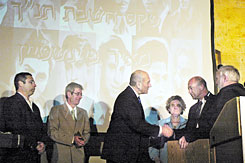
Ehud Olmert, the Prime Minister of Israel, shakes the hand of Goodwin's son, Denis Goodwin. Goodwin's wife, Mrs. Amy Goodwin, stands between Denis and the Prime Minister. My brother Eliezer is holding the small Bible (to the left of the Prime Minister).
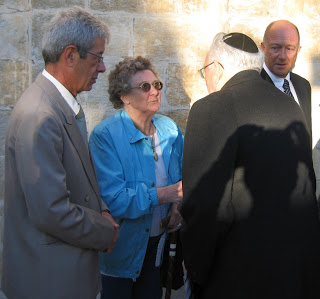
Eliezer Feinstein, Mrs. Amy Goodwin, and Denis Goodwin at the state ceremony.
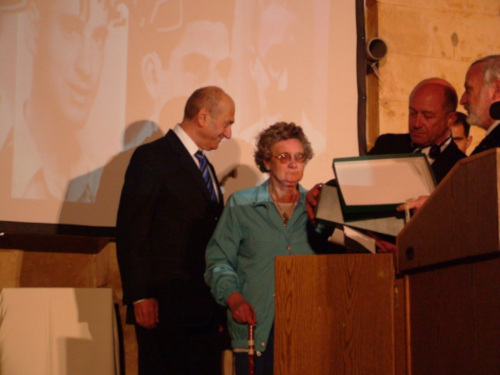
Israel's Prime Minister Ehud Olmert, Mrs. Amy Goodwin, and Denis Goodwin at the state ceremony.
Prime Minister Ehud Olmert's Speech at The Bible Return Ceremony
The Bible was returned to my brother Eliezer on April 19, 2007, during the state ceremony to commemorate the 60 year anniversary of the sacrifice of Meir and Moshe. Prime Minister Ehud Olmert was very emotional during the ceremony, because he came from an Irgun family, and Meir Feinstein and Moshe Barazani were his childhood heroes. Here are a few excerpts form his beautiful speech:
"... Like many others, I too grew up hearing the heroic tale of Feinstein and Barazani: their images are deeply engraved in my memory – the determined and powerful look of Moshe Barazani, and the calm and confident look on Meir Feinstein’s handsome face. They, who were in fact so young, became the heroes of our youth."
"...The life stories of Feinstein and Barazani ended in the darkness of a death row cell in the Central Prison in Jerusalem. However, even through the darkness, when the evil wind of the end of the Mandate Period blew through the Jewish yishuv in the Land of Israel, a ray of light pierced through. Because underneath the story of the national and heroic struggle, a personal story was also woven, a human story of mutual respect, almost friendship, between Feinstein and Barazani, the condemned, and Sergeant Thomas Henry Goodwin, the British guard who was charged with watching them."
"...Today, Sergeant Goodwin’s son is fulfilling his father’s wish to return the Bible to the Feinstein family. One cannot help but be moved."
"We are a people who sanctify life; we love the good in the world and its beauty. We are not a vengeful and vindictive people; we are not out for blood. However, on one thing we cannot compromise – on our freedom, on our basic right as a people to be ourselves, on our freedom to continue to believe in the human spirit and live in accordance with our world view and in the light of our culture. This was the desire of Feinstein and Barazani, what they fought for. And within the storm of the battle in which they were, under the shadow of the gallows, when they sang in their last hours of life Adon Olam, and our national anthem, the Hatikvah, they also spread seeds of hope – of faith in the goodness of people."
"This day, when the Bible is being returned to the State of Israel, proves that not only the sounds of explosion remain from that night of the new month of Iyar. This day proves that hope also echoes."